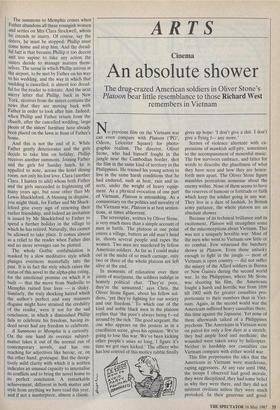ARTS
Cinema
An absolute shower
No previous film on the Vietnam war can even compare with Platoon (PG', Odeon, Leicester Square) for photo- graphic realism. The director, Oliver Stone, who had himself fought in the jungle near the Cambodian border, shot the film in the same kind of territory in the Philippines. He trained his young actors to live in the same harsh conditions that he had endured, such as heat; rain and in- sects, under the weight of heavy equip- ment. As a physical evocation of one part of Vietnam, Platoon is astonishing. As a commentary on the politics and morality of the Vietnam war, Platoon is at best senten- tious, at times abhorrent.
The screenplay, written by Oliver Stone, is very much more than a simple account of men in battle. The platoon at one point enters a village, batters an old man's head in, shoots several people and rapes the women. Two men are murdered by fellow American soldiers. As far as I could make out in the midst of so much carnage, only two or three of the whole platoon are left alive at the end.
In moments of relaxation over their joints of marijuana, the soldiers indulge in homely political chat. 'They're poor, they're the unwanted,' says Chris, the Oliver Stone figure, about his fellow sol- diers, 'yet they're fighting for our society and our freedom.' To which one of the kind and noble black men in the platoon replies that 'the poor's always being f---ed around by the rich.' The good sergeant, the one who appears on the posters as in a crucifixion scene, gives his opinion: 'We're going to lose this war. We've been kicking other people's asses so long, I figure it's time we got ours kicked.' The officer who has lost control of this motley rabble finally gives up hope: 'I don't give a shit. I don't give a flying f--- any more.'
Scenes of violence alternate with ex- pressions of mawkish self-pity, sometimes to the accompaniment of mournful music. The few survivors embrace, and falter for words to describe the ghastliness of what they have seen and how they are hence- forth men apart. The Oliver Stone figure mumbles portentous nonsense about the enemy within. None of them seems to have the reserves of humour or fortitude or faith which keep the soldier going in any war. They live in a daze of hashish. In British army parlance, the whole platoon are an absolute shower.
Because of its technical brilliance and its excitement, Platoon will strengthen some of the misconceptions about Vietnam. This was not a uniquely horrible war. Most of the men who went to Vietnam saw little or no combat. Few witnessed the butchery shown in Platoon. Even those unlucky enough to fight in the jungle — most of Vietnam is open country — did not suffer the misery of the Allied soldiers in Burma or New Guinea during the second world war. In the Philippines, where Mr Stone was shooting his film, the Americans fought a harsh and horrific war from 1899 till 1902 with far greater casualties pro- portionate to their numbers than in Viet- nam. Again, in the second world war the Americans suffered heavy casualties there, this time against the Japanese. Yet none of them afterwards talked of a Philippines psychosis. The Americans in Vietnam went on patrol for only a few days at a stretch; they had ample food and medicine; the wounded were taken away by helicopter. Neither in hardship nor casualties can Vietnam compare with either world war.
This film perpetuates the idea that the Americans in Vietnam were murderous, raping aggressors. At any rate until 1968, the troops I observed had good morale, they were disciplined, they had some belief in why they were there, and they did not mistreat civilians unless they were much provoked. In their generous and good- hearted way, the GIs would try to befriend the Vietnamese, especially the children. Many signed on for a second tour of duty. To get a truthful idea of the US fighting men in Vietnam, one should read Tim O'Brien's excellent novel, Going After Cacciato.
This film suggests that Vietnam some- how corrupted America. It is not just a lie but the opposite of the truth. It happened that the Vietnam war came at a time, the Sixties, when the United States was enter- ing on its'permissive society', with drugs, sexual licence and radical politics. Mari- juana and stronger stuff were chic. Films and magazines offered hard-core por- nography, of a perverse and often sadistic kind. The BlaCk Power movement and white urban guerrillas were all the rage in slum and campus. Conscription brought these things to Vietnam. The radicals, black and white, broke the discipline of the forces, sometimes `fragging' the officers and NCOs with fragmentation grenades. Marijuana and other drugs made soldiers ineffective against the enemy, but murder- ous killers of Vietnamese civilians. To- wards the end of America's time in Viet- nam, there were countless cases of rape and other sexual abuse of local women, for instance by forcing them to commit fellatio at gun point. With officers too scared to enforce authority, the dope-happy soldiers lived out the fantasies of the pornographic industry.
This film concludes with a sanctimonious dedication 'to those Americans who fought and died in Vietnam'. In fact, it insults their memory.





















































 Previous page
Previous page